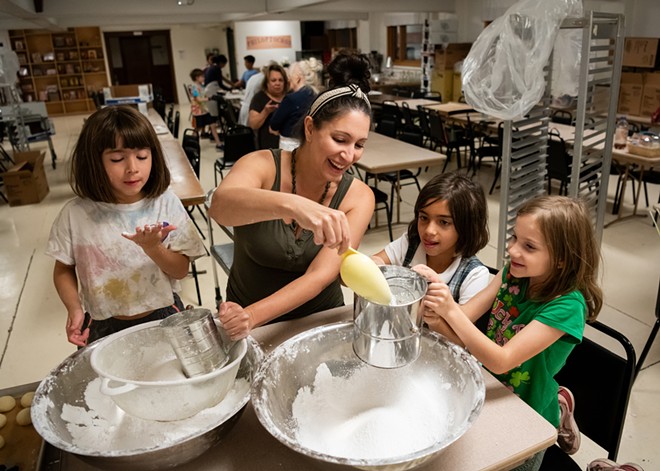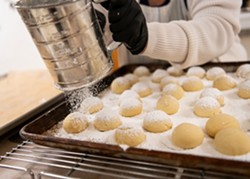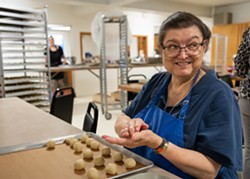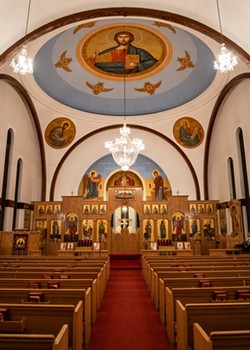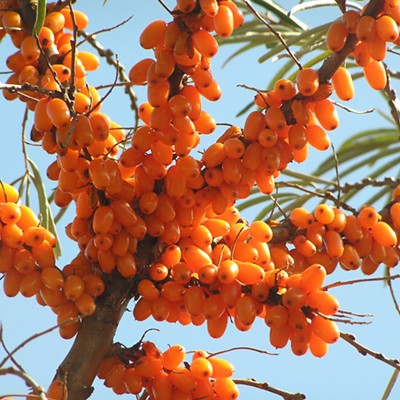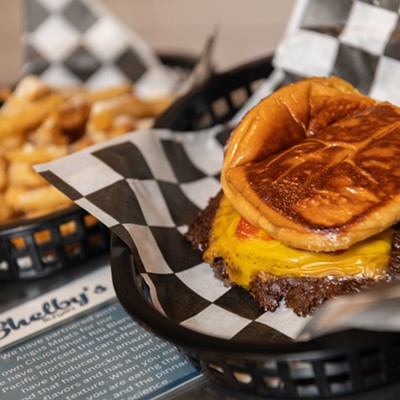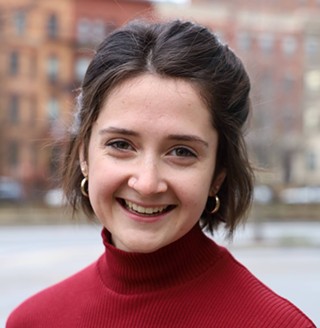Inside the Holy Trinity Greek Orthodox Church on North Washington Street, an icon screen separates the nave, where worshippers sit, from the inner sanctuary, where the altar table is. It's a common setup in Eastern Orthodox churches. The screen, also called an iconostasis, traditionally depicts saints and canonical scenes between ornate gold scrolling.
At Holy Trinity, one of these painted scenes shows a group of people feasting. It's from a story in Genesis, the first book of the Bible, where future-patriarch Abraham invites three strangers into his home to eat and drink.
It's a fitting homage in a church that hosts the longest-running Greek food festival in the nation.
Every fall since 1935, Holy Trinity has been inviting friends and strangers to come feast on authentic Greek food and culture. This year, Greek Fest is expanding, offering new homemade treats like spanakopita and lemon chicken alongside established favorites like honey-drenched loukoumades doughnuts, twisted sesame koulourakia cookies, gyro sandwiches and Greek fries. As always, there will be live music, dancing and church tours, plus this year's fest is adding a slate of activities for kids. Come for the baklava, stay for the friends.
Holy Trinity is also expanding its vision, using proceeds from the festival not only to support their own church, but to also support other local charities.
"I can't put into words what it means for our parish to be able to share our deep faith and cultural roots with the Spokane community, whether you've been joining us for decades or it's your first time experiencing this time-honored tradition," says Rev. Father Daniel Triant.
Parishioners met last February to begin planning this year's festival and started preparing food in June. On a Thursday morning in September, 10 women are gathered in the basement of Holy Trinity to make kourambiedes, Greek sugar cookies doused in mountains of powdered sugar.
The cookies are light, crumbly and sweet. But one woman says she calls them asphyxiation cookies because you have to hold your breath to eat them. Breathe in when the powdered sugar is too close and — bam! — the back of your throat is covered. Apparently, kids and young men have risky competitions to see who can eat a whole cookie the fastest without choking. To be clear, this is not recommended.
Liza Supica, a woman in her 20s and the youngest of the group by far, makes the dough. Ten pounds of clarified butter, plenty of egg yolks, and a plastic tote bag of flour go into an ancient, commercial-grade stand mixer.
"This thing is so much older than I am," she says, estimating the hunk of machinery is at least five decades old.
Liza's father, Stephen, was the previous priest at Holy Trinity and retired just three years ago. Liza has been helping prepare for the festival since she was a little kid. Once the dough is combined in the mixer, she heaves the weighted silver bowl up out of the mixer, carries it out of the kitchen and scoops the dough onto a clean table in the main room where the other women, all her mothers' age, are working.
"I make the dough because I have the best shoulders," she laughs.
The rest of the women take turns measuring the dough with melon ballers and rolling them into perfect spheres. As the scoopers click, the women laugh about a parishioner who helped run the Greek Festival for years and taught most of them how to bake but intimidated them with her obsession for uniformity. When the parishioner died, Liza's mother, Irene, took her spot as the most experienced baker.
All around, the fruit of the womens' labor is piling up. Tens of metal kitchen shelves hold 14,000 pieces of unfinished baklava waiting to be baked and drenched in syrup. Upstairs, the main gathering room is already filling up with finished koulourakia cookies, which are twisted by hand and coated in sesame seeds. Today, the women will make hundreds of kourambiedes, and this is only one of the seven days in September that they've dedicated to this cookie alone.
Irene says that preparing for the festival gives congregants a chance to get to know one another better. They make food together and eat meals together, since baking can last from morning through the afternoon.
"Everything is about food," she says. "That's what it means to be family — we eat together."
Philoxenia, a Greek work for hospitality, means "love of the stranger." It has deep roots in Hellenic culture, which loves honor — especially the honor of being generous to others, says Father Triant, Holy Trinity's current priest.
Greek Fest invites everyone, parishioner or not, to be part of the family. Authentic, delicious food draws people in, and once they come, they don't want to leave.
"People come and say, 'We love Greek Fest because we just sit and talk to people we've never spoken to before,'" Triant says.
Upstairs in the sanctuary, the scene of Abraham feasting with three strangers occupies the center left panel of the iconostasis, a very special place on the icon screen. This panel typically displays the patron saint or namesake of the church. Holy Trinity is named for the Trinity, a theological conundrum that claims God is both three and one, which is notoriously impossible to paint.
But as the story in Genesis goes, the three strangers who eat with Abraham turn out to be divine. Christians believe that Abraham's generosity to the stranger allows him to meet God. The feast they share together reveals who God is, and the scene is therefore a fitting depiction of what the Trinity looks like.
At Holy Trinity, loving the strangers who walk through their doors looks like eating good food together, dancing and laughing and becoming family. It looks like getting covered in powdered sugar, licking sticky fingers, or mopping up lemon juice and olive oil with a last bit of pita. It looks like sharing a meal with someone from a different nationality, or a different neighborhood.
So come early and stay late. But don't be greedy if the food goes quickly — even with advanced preparations and the most batches they've ever made, there's still a good chance the baklava and kourambiedes will sell out before the good conversations end. ♦
Holy Trinity Greek Festival • Thu, Sept. 28-Sat Sept. 30 at 11 am-8 pm • Holy Trinity Greek Orthodox Church • 1703 N. Washington St. • holytrinityspokane.org • 509-328-9310

